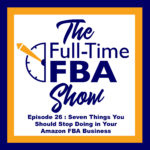There will always be more and more things you can do to be productive, free up time, and accomplish more in your Amazon FBA business. Yet oftentimes we do a few things that are actually counter-productive and ultimately hinder the growth of our businesses. In today’s episode, we highlight seven things you should stop doing if you want your Amazon FBA business to flourish.
These seven things to stop doing are all easy-to-follow, actionable steps that anyone with an Amazon FBA business can benefit from. When you stop doing these seven things, you’ll see just how much they were holding you back from reaching your full success potential.
Listen on the podcast player below.
Like what you hear? Tell a friend… and be sure to leave us a rating and a review. Here’s how.
Key points from episode 26:
 Some Amazon sellers are tempted to do this to get ahead in their Amazon business, but they are actually harming their business instead.
Some Amazon sellers are tempted to do this to get ahead in their Amazon business, but they are actually harming their business instead.- How to better understand your seller metrics and how they impact your success and profits.
- Doing this could actually cause Amazon to limit the number of items you can send in to an Amazon FBA warehouse.
- How many SKUs you need to have in stock before you start using this one Amazon growth strategy.
- The main way you are ruining the growth potential of your Amazon business.
- This one thing is stealing the joy from your Amazon business and could cause you to be tempted to quit.
- The one strategy we think we are good at, but actually it’s hurting our success in the long run.
- And much more!
Links and resources mentioned in this episode:
 Amazon Guidelines
Amazon Guidelines- How to Improve your IPI
- BQool Automatic Repricer
- BQool Review (with a special free bonus!)
- InventoryLab
- InventoryLab Review
- Special Bonus for Trying InventoryLab with a 1-Month Free Trial
- MileIQ
- MileIQ Review
- Full-Time FBA Free Sales Rank Chart
Right-click here and save as to download this episode to your computer.
 More Episodes from The Full-Time FBA Show podcast:
More Episodes from The Full-Time FBA Show podcast:
Don’t miss an upcoming episode! Subscribe, download episodes, and review the Full-Time FBA Show:
-
-
- Subscribe on iTunes
- Follow on Spotify
- Follow on Amazon Music (or just ask Alexa to “play The Full-Time FBA Show podcast”)
- Follow on iHeartRadio
- Subscribe on Podbean
- Subscribe on Podbay
- Subscribe on Podchaser
-
![]()
 One of the ways you can make selling on Amazon FBA easier is to know ahead of time exactly what to expect each and every month of the year.
One of the ways you can make selling on Amazon FBA easier is to know ahead of time exactly what to expect each and every month of the year.
Imagine what it would feel like knowing you were not missing out on any of the opportunities that will come your way this year. Imagine working on your Amazon business knowing exactly what your priorities are, what you need to avoid, and what you need to accomplish during each month to make progress toward making this year your best sales year ever.
Now you can with the course The Reseller’s Guide to a Year in FBA: A Month by Month Guide to a Profitable Amazon Business. The package includes a 220+ page ebook, live training videos throughout the year, a private Facebook group, and more!
![]()
Back to the main page for The Full-Time FBA Show
![]()
Episode 26 Transcript:
 [INTRODUCTION]
[INTRODUCTION]
[0:00:01.8] ANNOUNCER: Welcome to The Full-Time FBA Show. In each episode, it’s our goal to help you turn part time hours into a full-time income, selling almost anything on Amazon. Now, your hosts of the show, Stephen and Rebecca Smotherman.
[INTERVIEW]
[0:00:21.3] STEPHEN: Welcome to episode number 26 of the Full-Time FBA Show we are looking forward to talking with you today about seven things you should stop doing in your Amazon FBA business. And to talk about that with us today is my wife and co-host, Rebecca. How’s it going?
[0:00:37.2] REBECCA: It’s going pretty good.
[0:00:38.8] STEPHEN: Good. When we tell you seven things you need to stop doing, guess what? That’s going to free up some more time and will help you become more productive and more focused and you’re going to be able to accomplish more so I am looking forward to talking about this today.
[0:00:53.4] REBECCA: I’m looking forward too, it’s a little bit different from a lot of the information you normally hear about what to do in your business, “You need to do this. You need to do that,” but today we’re talking about things you should stop doing. This should be good news.
[0:01:06.2] STEPHEN: Yes, let’s talk about that right now.
[0:01:10.9] REBECCA: Okay, Stephen, what do you have for us to start this conversation off? We’ve got seven things we want to talk about today that we should stop doing in our Amazon FBA business, what’s the first one?
[0:01:20.4] STEPHEN: Yeah, some of these things that we’re going to talk about are pretty obvious and other ones you might not have thought about. But the first one is stop bending or breaking the rules. Amazon’s pretty firm about their guidelines. In fact, if you could read them for yourself, that would be awesome, fulltimefba.com/guidelines. But for those of us who like to kind of live on the edge, bending the rules or even going further and breaking them is a quick trip to a suspended account and definitely not something that we teach people to do.
[0:01:50.9] REBECCA: Right. In fact, that’s one of our guidelines in our Facebook group is that we don’t discuss ways to bend the rules. We don’t discuss ways to break the rules. We don’t ask questions about, “How can I do this and still stay in the terms of services?” Unless it’s a legitimate question. But we’re not looking for ways to get in that grey area or figure out how far we can push the line. We want to be completely above board so that there’s no question that we are completely following Amazon’s guidelines. And there is no way to construe it or doing as anything that we can be suspended over or get in trouble for.
[0:02:29.8] STEPHEN: Yeah, you might start noticing patterns if you’ve been listening to this podcast for a while or following our blog for a while. We like to teach the safest, most productive strategies. And so, a lot of times, people think, “I got to live on the edge. I got to bend the rules, break the rules in order to get ahead in the game.”
[0:02:47.9] REBECCA: “Because it’s just so hard, I can’t do this if I don’t get a little extra edge or a little extra help.”
[0:02:52.6] STEPHEN: Right, we like to focus on how to maximize your profits and your sales while staying within Amazon’s rules because as maybe you’ve heard before, this is Amazon’s playground, they make the rules. They are a pretty swift to enforce those rules at times and we just don’t want to mess around with that. Your Amazon business and possibly your livelihood is at stake here so we want to keep things on the safe side.
[0:03:14.8] REBECCA: Amazon knows everything you’re doing, anyway. They have control of Amazon Web Services, the Internet. They know your IP address. They know what you’re trying to pull over on them, so don’t think that you can trick them for very long.
[0:03:25.5] STEPHEN: Right, exactly.
[0:03:27.1] REBECCA: I would hope that one’s going to be a pretty easy one for all of us to stop doing because hopefully we’re not doing it to begin with. All right, what’s the second one that you have for us?
[0:03:35.4] STEPHEN: The second thing you need to stop doing, stop ignoring your seller metrics. This includes your feedback scores, includes your seller health that you can find that if you log into Seller Central. Hover over ‘performance’ and then you can click on and see your seller health page that includes IP complaints, authenticity complaints, selling restricted items and so on.
A lot of times, we just kind of go along our business and we are looking for inventory, and we’re selling it and we’re seeing those sales and we’re reinvesting that profit. And sometimes your seller metrics could get dinged, sometimes Amazon will email you and let you know. But sometimes they just show up in your performance metrics and we don’t know about that.
Stop ignoring your seller metrics. It’s important for you to know what to do in order to fix those and to get on those quickly so that it does ding your Amazon account.
[0:04:29.2] REBECCA: This is a little bit different, it’s not exactly the same thing as your seller metrics but I want to add a 2.5 here.
[0:04:36.2] STEPHEN: Sure.
[0:04:36.3] REBECCA: Don’t ignore your IPI. You’ve got your seller metrics and then you’ve also got your inventory performance index, don’t ignore that either. You want to check in on that one regularly. At the time of this recording, you need to stay above 400. So, make sure that you’re doing all of the things that Amazon is suggesting on the dashboard that you have there in Seller Central. Check in on each of those different suggestions and make sure that you’re doing what they’re asking you to do or you could find out that you have storage limits at the warehouses.
[0:05:05.7] STEPHEN: Yeah, because that’s Amazon’s consequence if you have an IPI score that goes below 400 for the next quarter, the next three months, Amazon will limit the number of inventory items you can send to Amazon. If you’re curious for some help on how to improve your IPI, we got a blog post that can help you with that, fulltimefba.com/improvemyipi.
[0:05:26.8] REBECCA: All right. That was just on the spot there, we had a little bonus 2.5. What is the third thing that you would say Stephen that we need to stop doing in our Amazon FBA business if we want to be truly successful?
[0:05:39.4] STEPHEN: yeah, I would say that this is true for anyone who has over 50 SKUs in your Amazon account, stop manually re-pricing. Re-pricing is a huge component of success. It’s a huge component of being able to snowball your profits faster. Making sure that your prices are competitively priced all the time is really big.
If you have under 50 SKU in your account, you know, maybe you can manually re-price but even then, an automatic re-pricer will go in every 15 minutes, you can pay a little bit more to get it even faster than that, more often than that and will make sure your prices remain competitive while remaining within your minimum and maximum price guidelines.
This is huge. This is something we put off in our Amazon account.
[0:06:25.4] REBECCA: Way too long.
[0:06:27.4] STEPHEN: Way too long, yes. Once we started doing this, we saw the results and it was amazing. If you’re interested in what we used when it comes to automatic re-pricing, go to fulltimefba.com/bqoolreview and it’s a quick little review of the re-pricer that we use.
[0:06:44.4] REBECCA: I have a question about this one. When you say 50 SKUs, what kind of SKUs are you talking about? What if you do private label or bundling? You’ve created your own listings. You mean 50 SKUs where you have competition, right?
[0:06:56.1] STEPHEN: Yes, if you do not have any competition, then you don’t have to worry about re-pricing. Because re-pricing is dependent upon the prices of your competition. Now, you can set it up for that if you want but if you don’t have competition then re-pricing really is not that much of an issue for you.
But for the items that do have competitions that come and go, especially if Amazon’s competing, a re-pricer is essential.
[0:07:22.0] REBECCA: Okay, very good. Moving on, fourth one that we have here, what would you say about – what do we need to stop when it comes to working hard on everything yourself in your business?
[0:07:33.8] STEPHEN: Yeah, the fourth thing we need to stop is to stop doing everything yourself. This is kind of going back to our previous point, stop manually re-pricing. Get an automatic re-pricer to do it for you. There’s so many other things in your Amazon business that you can outsource so that you can stop doing it. I mean, you can hire someone to come in to your home to help you prep up your inventory for you. You can outsource to a prep center.
You can outsource your Amazon backend logistics, I mean, there’s a lot of different ways that you can outsource your Amazon business so that it will free you up to do the more important things, which mostly is sourcing for more profitable inventory. Stop doing everything yourself. You are limiting your growth by doing everything yourself.
[0:08:17.1] REBECCA: “But Stephen, I don’t trust anybody else to do it as well as I can do it.”This is the thing we hear the most often. “But Stephen, I don’t want to give up control of fill in the blank task because I do it really well and I’m not sure other people will do it as well.”
[0:08:31.9] STEPHEN: I can totally relate because I mean, Rebecca both you and I have felt the exact same thing. Then we started thinking, “Wait a minute, if we sell via FBA, we are already outsourcing our inventory storage, our inventory shipping, a lot of our customer service or outsourcing our returns. We are already outsourcing and guess what? We’re still alive.”
Being able to outsource other things, give it a shot, you don’t need to sign up for everything right now, outsource on thing and see how it goes and give it a trial run and if you like it, then you can continue doing it. But I’ve never heard of anybody ever saying, “I wish I outsourced later.” Everyone wishes they outsourced sooner.
[0:09:12.0] REBECCA: Yes, very true. I know that is the case for so many different tasks that we have outsources. It is like once we finally do it, once we finally get passed that mental aspect of giving up control or even just the mental aspect of, “I don’t even know how to hire somebody else, that is a whole new thing I have to learn.” But once we get passed that every single time we outsource something new, we think, “Why didn’t we do that months if not years earlier?”
[0:09:35.4] STEPHEN: Yeah and right now we are at the stage where like, “How can we outsource this? What’s this new thing? How can we outsource that?”
[0:09:40.5] REBECCA: We are constantly looking at, “Okay what are we doing every day? What else can we outsource?”Okay, so number five on our list here, what do you have as the number five thing we need to be looking at stopping or doing in our FBA business?
[0:09:55.1] STEPHEN: So this might be hard because sometimes it just come naturally but stop comparing your business to someone else’s. A lot of us spend a lot of time on Facebook, we can see other people posting about their successes, maybe a huge cartful of inventory or their sale page numbers, which we actually try not to allow in our own Facebook group because a lot of times it is kind of bragging. But don’t compare yourself to someone else’s business.
Because you don’t know what their cash flow is like, you don’t know what their debt situation is like. Do you not compare your chapter two with someone else’s chapter 12.
[0:10:29.3] REBECCA: I will add to that, you don’t know what their family situation is like. You don’t know if they don’t have another job that they can spend full-time doing what you are trying to do in part-time. There is so many factors that go into it.
[0:10:41.3] STEPHEN: Yeah and Teddy Roosevelt is attributed to saying, “Comparison is the thief of joy” and so if you start losing your joy in your Amazon business it might be because you are comparing yourself to someone else when you don’t know the whole story.
[0:10:54.6] REBECCA: Instead compare yourself to yourself. Compare yourself to your own goals that you’re setting and make sure that you are setting those goals, working towards them, checking in periodically to make sure that you are making progress slow but steady. And when you do it that way, you are just guaranteed to be satisfied and content rather than disappointed when you are comparing yourself to others. Okay, number six on our list Stephen, what do you have for us?
[0:11:19.1] STEPHEN: Number six, we’re almost to number seven but number six is stop forgetting to track your numbers. The wisdom found in knowing your numbers really will help you find a faster way to success that is why we use InventoryLab. It tracks our buy price. It tracks all of our returns, it tracks every type of fee that goes into it. We can look into category reports to see which categories are selling best for us. We can do store reports so we know which supplier or store is doing best for us.
So don’t forget to track your numbers. This also involves mileage. You know stop forgetting to track your mileage. We use MileIQ to track our mileage automatically just again, this is part of outsourcing. There is tools out there that can help track your numbers even if you are starting small, just having a simple spreadsheet to track your numbers is something that will help you find growth and find success in the long-term.
[0:12:14.1] REBECCA: So is this the kind of thing tracking your numbers, is this something that you recommend doing every day, once a week, once a month, once a quarter, once a year? How do you take care of this kind of a thing?
[0:12:24.2] STEPHEN: I mean I think any time that you have a situation come up where you need to track something, you buy inventory, you go out and do retail arbitrage, make sure those numbers are tracked. You get a bill that comes in for a service that you are paying for, track that right then and there. And so you know there is a lot of things like I said before, Inventory Lab and MileIQ they can track things for you but even on the things that are not automatic, you need to be tracking those because if you don’t do –
[0:12:49.3] REBECCA: On a regular basis.
[0:12:50.7] STEPHEN: Yes, on a regular basis because if you don’t do it you are going to forget or it might fall off on your mind and never return. And that just messes up your numbers as a whole and you want to make sure your numbers are good too when it comes to tax season to make sure that those numbers are correct.
[0:13:04.2] REBECCA: So what do we have for our last item on our list? Number seven.
[0:13:09.1] STEPHEN: Our last one is to stop multi-tasking. There are a lot of different things that you can do in your Amazon FBA business to help move it forward but one of the biggest keys is to focus. You might have heard this acronym before, taking the letters and spell the word focus, follow one course until successful. It is important to stick with one task. You know whatever you are doing in your Amazon business and focus on that.
If we try to multi-task and do too much stuff at once, it will cause distraction and it will cause slower progress in the goals that you are setting. So say you went out and your source retail over charging, you came home. Someone who does multi-tasking might take off the stickers of that item, then scan that item into their computer and then pick a price and then get it into a box and then go get the next item and take the stickers off of that item.
That is way to scattered, way too much multi-tasking. It is a lot better to take all the stickers off your inventory and then put all of those items into your inventory and then price all of those items and then package all of those items. It is much more streamlined. Saves a lot of time and it helps you be more successful.
The same thing can be true when it comes to learning something. You know if you are learning something new with your Amazon FBA business, who is going to be more successful? Someone who learns retail arbitrage on Monday, online arbitrage on Tuesday, wholesale on Wednesday, another strategy on Thursday? Or someone who spend all week long focusing on online arbitrage. The person who spends every day focusing on online arbitrage is the one who is going to find the most success because they are not multi-tasking, they are focused.
[0:14:40.8] REBECCA: And we understand that there are a lot of aspects to running a business but you can’t necessarily only do one task at a time. But we are talking about I guess another word for it would be batching. You know concentrate on one task so that you can get it finished and then move on to do another task. Set aside Mondays as a sourcing day and then Tuesday is going to be your prepping day that kind of a thing, if your situation will allow it.
Rather than Monday morning, “I am going to source,” and then on Monday afternoon, “I am going to prep.” And then Tuesday go back out and source some more and Tuesday afternoon prep. Consider ways that you can put your tasks together so that you can have more focus, energy getting it done and not be scattered and getting a little bit of everything done instead of a lot of one or two things done.
[0:15:27.2] STEPHEN: Yeah, when you focus you are going to just meet your goals so much faster.
[0:15:31.7] REBECCA: All right, well I think we’ve covered everything that we wanted to cover in this list. What do you think Stephen? Is that about everything we had to talk about?
[0:15:39.1] STEPHEN: That is everything for today, for sure. So just stop doing those things and I give you permission to stop so that you can focus on better things.
[0:15:45.9] REBECCA: Sounds good. I like it when we give each other permission because sometime it really takes somebody else saying, “Look that is not the best idea. You should stop that.”
[0:15:54.3] STEPHEN: Right. And all of the things that we talked about, the links and the resources, you can find those in the shownotes at fulltimefba.com/26 and you will find all the information here.
[END OF INTERVIEW]
[0:16:08.7] REBECCA: So we look forward to seeing you back here next week. We are going to have a behind the scenes look at a full-time FBA business. So don’t miss that you are going to want to hear what goes into running a full-time FBA business from behind the scenes.
[0:16:21.4] STEPHEN: Yeah, we’re going to give you a little sneak peek into how we grew our Amazon business to full-time by only spending part time hours and we are just going to give you a little sneak peek behind the curtain. So stay tuned for that in the next episode.
[0:16:33.4] REBECCA: And also we want to make sure that you are aware we have a free gift for you. As always you can check out the sales rank chart freebie that we have at the Full-time FBA website. If you go to fulltimefba.com/salesrank, you will find a sales rank chart that we update on a monthly basis that breaks down all of the Amazon categories in the top 1%, 2%, 3%, 5%, and 10% of each category in their sales rank so that when you are making a sourcing decision you can look at where does that item fall and how does that break down in its own category in Amazon sales rank.
So check that out at fulltimefba.com/salesrank and you can get a free PDF delivered to your inbox every month.
[0:17:16.3] STEPHEN: Yep, well that is it for today, thanks so much for joining us on the Full-Time FBA show. We’ll see you again next week.
[0:17:22.6] REBECCA: Bye.
[OUTRO]
[0:17:25.0] ANNOUNCER: That is all for this episode of The Full-Time FBA Show. So head over to fulltimefba.com/podcast, where you will find the shownotes and links from this episode. While you’re there, subscribe to our newsletter where you’ll get several free downloads of our popular and helpful Amazon FBA resources. Now, take action on what you have learned today so you can find success at turning part-time hours into a full-time income with Amazon FBA.
[END]

Leave a Reply